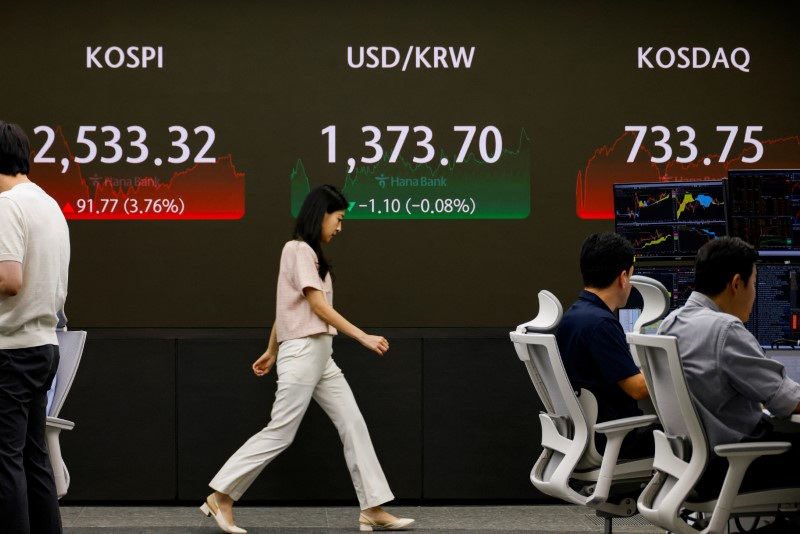By Jihoon Lee and Cynthia Kim
SEOUL (Reuters) – South Korean investors are defying last week’s rout in global financial markets by pouring even more money into U.S. stocks, a yearslong trend that analysts and investors are betting will continue due to the low value proposition at home .
South Korean retailers this year have Nvidia (NASDAQ:), Tesla (NASDAQ:) Inc. and picked up shares of Apple (NASDAQ:), fueled in part by the global AI frenzy, a move that comes despite government efforts to boost the domestic market. stock market.
Sunny Noh, a 49-year-old who has been investing in Tesla since 2020 and now owns about 85% of his financial assets in the electric vehicle maker, said he sees the recent market downturn as a long-term buying opportunity.
“It may drop in a year or two, but in the longer term of 10 years it will rise again,” he said.
Retailers like Noh are frustrated by the so-called “Korea discount” of lower shareholder returns and depressed valuations in the $1.8 trillion stock market, home to global tech titans like Samsung Electronics (KS:) and SK Hynix and automakers like Hyundai Motor . (OTC:).
For example, for South Korean listed companies, the ratio of dividend payout to net profit has averaged 26% over the past decade, lower than 55% in Taiwan, 36% in Japan and 42% in the US. the Financial Services Commission.
Investors are even more disappointed that Samsung and Hynix are not at the forefront of the AI boom. Shares of Samsung are down 4% so far this year, compared to a 120% rise for Nvidia. Hynix did better, with an increase of 25%.
The price-to-book ratio over the past ten years for Korean companies averages 1.04, compared to 3.64 for the US.
These figures partly explain why retailers, colloquially known as ‘ants’ because of their huge numbers of 14 million and their ability to act as a powerful collective force, have been investing massively in overseas markets for well over a decade.
Ants like Noh bought $9 billion worth of U.S. stocks between January and July this year, after selling $2.8 billion in 2023 – the first sell-off after three years of U.S. stock investments.
They sold a record 16.3 trillion won ($11.9 billion) worth of domestic stocks during the same period, sending shares down 1.3% and up 13% and 5% respectively so far this year.
To be fair, foreign purchases of Korean stocks also rose to a record 27 trillion won between January and July, but these accounted for 27% of average daily sales, compared to 54% for retailers.
FAILING AMBITIONS?
The trends in retail outflows pose a problem for Yoon Suk Yeol’s government-driven ambitions to boost depressed stock valuations. A planned capital gains tax, scheduled for next year, is also expected to discourage investors, although Yoon has vowed to scrap it.
Oh Jeong-min, a 42-year-old private investor who lost about 10%, or about 100 million won ($73,012) from his domestic and U.S. stocks during last week’s market shock, says he has recovered some of the losses and plans has to buy shares. more US stocks “when the time is right.”
“The kind of dividend payout and shareholder return trend that I see in U.S. companies is simply difficult to recognize in Korea,” he said.
Noh and Oh are part of a group of eight analysts, investors and government officials who told Reuters they expect the trend of fund outflows to continue as an aging population seeks higher returns.
“We are aware of the trend and the aim of the Value-up Program is to vitalize investments of not only retail investors but also institutional and foreign investors by making the domestic stock market more competitive,” said an official of the Financial Services Commission.
In February, the government proposed a Corporate Value-up Program, which reflects Japan’s capital market reforms and includes tax incentives to attract private investors.
Many analysts say the program is likely to have only a modest impact because of the opaque governance structures of South Korea’s family-run “chaebol” conglomerates, where controlling families usually pass their interests on to the next generation at a low market value.
“While in Japan the stock market’s mere directive to make improvements was apparently enough to bring about change, it is doubtful that government persuasion alone will be enough in Korea, at least for Chaebol groups,” analysts said from Mondrian Investment Partners. remark.
In early July, Elon Musk called South Koreans “smart people” in an X-post after data showed Tesla was the largest U.S. stock owned by South Koreans. Their holdings stood at $13.6 billion at the end of July, followed by Nvidia with $12 billion and Apple with $5.1 billion.
“South Korea has become a notable market in Asia, with the size of South Koreans’ investments in U.S. stocks now exceeding that of Japan,” said Seungyeon Kim, CEO of Toss Securities.
Oh, the retail investor is betting on more upside potential for US stocks.

“There is no doubt that as an investor you should choose the US market if you think long term.”
($1 = 1,369,6200 won)


